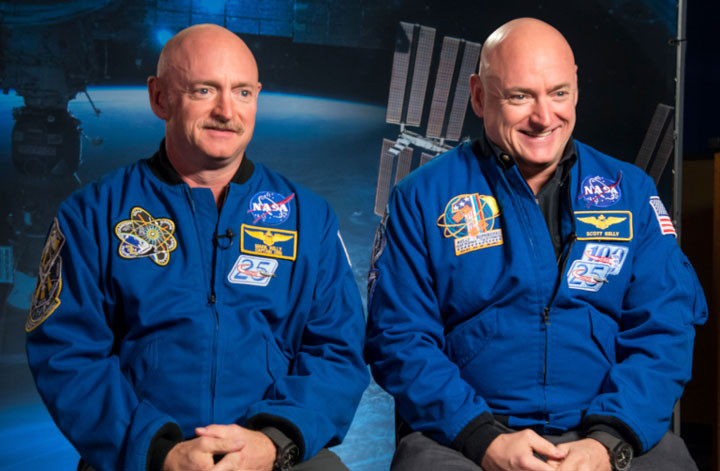NASA astronaut modified DNA after a year in outer space
Traveling in space has a lot of risks and dangers, and even when the trip is convenient, it seems that staying in space also causes unpredictable effects.
That was the result of a study from NASA, discovered from the twin brother astronaut and Mark Kelly case, to see how life outside of space might affect life. .
To accomplish the study, NASA astronaut Scott Kelly spent a year living in outer space. In particular, his mission was to stay at the International Space Station (ISS) for a period of 342 days. The brother Mark, a retired astronaut, is a twin brother and shares a DNA pair with Scott. This provides an unprecedented opportunity for NASA to be able to study how long-time travel in space can affect our bodies and genomes. As a result, space travel really makes people change. And it was only when Scott returned to Earth that the researchers discovered that Scott's DNA had changed a lot.

Pair of twin astronauts Scott Kelly and Mark Kelly.(Photo: BGR).
Specifically, the telomere structure (a structure at the end of the chromosome chain, which will gradually shrink as Scott's old man) becomes significantly longer when in space, according to scientists at NASA. explain. The team added: "Although this finding has been presented since 2017, the team examined this sudden change by polymorphic tests and genetic tests. In addition, a new finding shows that most telomeres were shortened within two days after Scott returned to Earth. "
Most of Scott's genes return to their normal state after a short stay in Earth. However, some of his genes have been permanently changed. According to the researchers, about 7% of Scott Kelly's genes have shown long-term changes when compared to the brother's DNA. These mutated genes remained the same for two years since he returned to Earth, which even surprised him.
In an interview with Scott Kelly on March 8, 201, he said: "I read a newspaper the other day and said that 7% of my genes were permanently changed. I read it and thought: "Oh, it looks strange".
"Twin studies" is one of the preliminary steps to lead more "long-term" missions to NASA's Mars. The organization has also set out certain plans and is working hard to be able to implement them as soon as possible. But what it does not mean human factor will be ignored by NASA. The Martian mission can last up to 3 years, and this is also the longest time we have been outside the universe. Is the human body capable of going through such a journey? We won't have to wait too long until the researchers answer this question, because some scientists still expect the first trip to Mars to happen in the early 2030s.
- NASA research on changes in space
- How to eat and sleep on other universes in Earth?
- China aspires to create genetically modified seeds in outer space
- How do astronauts brew coffee in outer space?
- Work inside NASA's top-secret control room
- NASA's most impressive moments of 2016
- Video: A miserable astronaut squeezes a wet towel on a space station
- Astronaut about to have a 'happy' outfit
- After Armstrong, will women walk on the Moon?
- Now you can train yourself to become an astronaut through ... smartphone
- The reason NASA once turned away from female astronauts
- Journey thousands of people choose one to become NASA astronaut
 Van Allen's belt and evidence that the Apollo 11 mission to the Moon was myth
Van Allen's belt and evidence that the Apollo 11 mission to the Moon was myth The levels of civilization in the universe (Kardashev scale)
The levels of civilization in the universe (Kardashev scale) Today Mars, the sun and the Earth are aligned
Today Mars, the sun and the Earth are aligned The Amazon owner announced a secret plan to build a space base for thousands of people
The Amazon owner announced a secret plan to build a space base for thousands of people